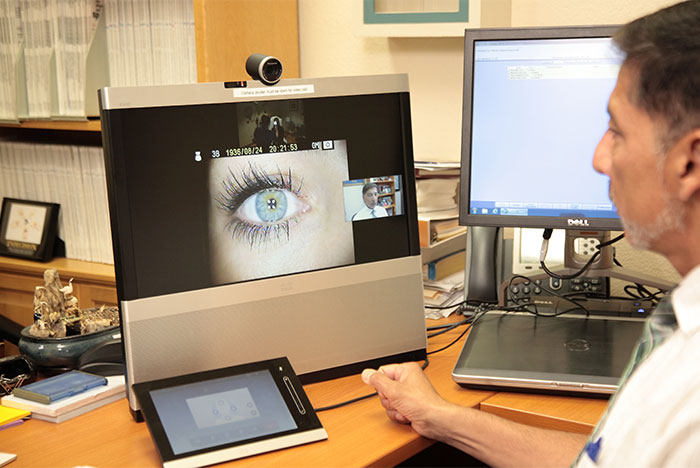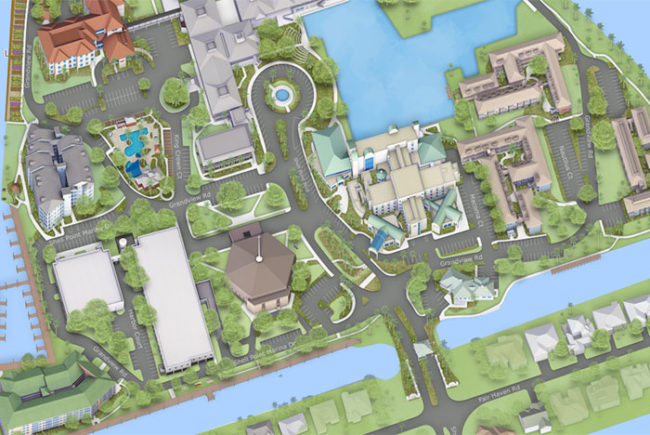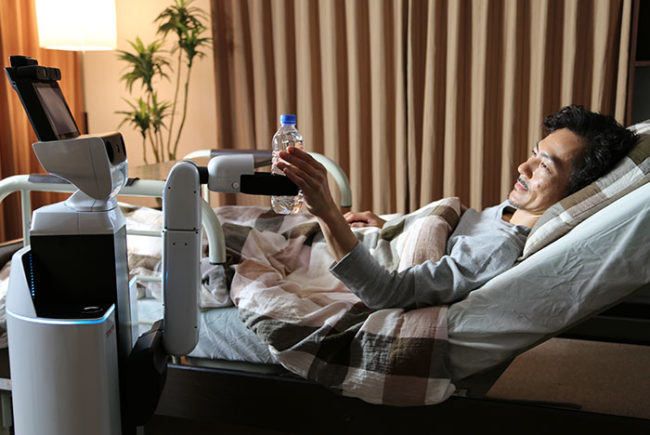
Rocky Kohsla, M.D., consults with a patient via Centura Health's teleconcussion program.
Teleconcussion program wins national innovation award
Centura Health’s teleconcussion program received national recognition from the Colorado Academy of Family Physicians. The group honored Centura Health’s program with its 2017 Patient-Centered Innovation Award for addressing a specific need among Colorado’s mountain and rural communities.
Rocky Kohsla, M.D., who developed the program, is a family physician within the Centura Health Physician Group. He also focuses on sports medicine and brain injury medicine and serves as the medical director of St. Mary-Corwin Medical Center's Concussion Consultants at Centura, Pueblo, Colo.
Centura Health's decision to expand concussion management services to the mountain communities was based on an evaluation of the community's needs and the high prevalence of traumatic brain injury diagnoses.
The teleconcussion services include two-way, audiovisual communication during which Khosla provides his expertise and recommendations for care. "I click onto a camera system and we look at the patient together. I do a fairly comprehensive evaluation of the patient and then formulate a plan to see whether we need imaging, rehab or if there are issues the primary care physician should be aware of," Khosla explains.
VA grants help to develop assistive-home technology for vets
The Department of Veterans Affairs (VA) awarded $599,802 in grants to help develop new assistive technology that can help veterans and service members with disabilities to live independently.
Three grants were awarded through the VA's Specially Adapted Housing Assistive Technology (SAHAT) Grants Program. One is going toward a company that develops assistive technology that facilitates independent living for veterans with disabilities, while another was granted to help develop the RoboTable — a robotic overbed table for independently accessing mobile devices from bed. The third grant will go toward developing Internet of Things-enabled home safety assistance for people with cognitive impairments.
The VA administers the SAHAT benefit to help veterans and service members with service-related disabilities purchase or modify a home. Typical adaptations include ramps, wider halls and doors, or wheelchair-accessible bathrooms. New technology developed under the grant program will be added to the list of home modification options as they become available.
However, the VA states that there are many emerging technologies that could help veterans even more, such as voice-recognition and voice-command operations, living environment controls and adaptive feeding equipment.
“We are very excited to see how the finished assistive technology projects will enhance the residential lives of our veterans with severe disabilities,” says Curtis L. Coy, deputy undersecretary for economic opportunity in the Veterans Benefits Administration. “These new technologies provide innovative solutions to help program participants live more independently within their homes.”
Anesthesiologists study virtual reality's effect on patient anxiety pre-surgery
Two professors at the University of Toronto’s department of anesthesia are studying the use of virtual reality to help ease the angst of patients before undergoing surgery.
Professors Fahad Alam and Clyde Matava created the Collaborative Human Immersive and Interactive Lab, which has virtual reality spaces at Sunnybrook Hospital and the Hospital for Sick Children.
In these facilities, patients don special virtual-reality goggles that let them experience the journey of being prepped for surgery and being transferred to the operating room. Alam and Matava monitor the patients’ anxiety levels through blood pressure, heart rate and self-assessment. Then they compare these data with those of a control group that watched traditional instructional videos before their operations.
While the study is still ongoing, Alam and Matava already are receiving positive feedback from patients who have used the virtual-reality technology.
“I have never heard the phrase ‘this is so cool!’ so often,” says Alam. “Everyone is amazed by the content and in awe of the environment we are able to immerse them in.”
Watch the video below to learn more about the study.





